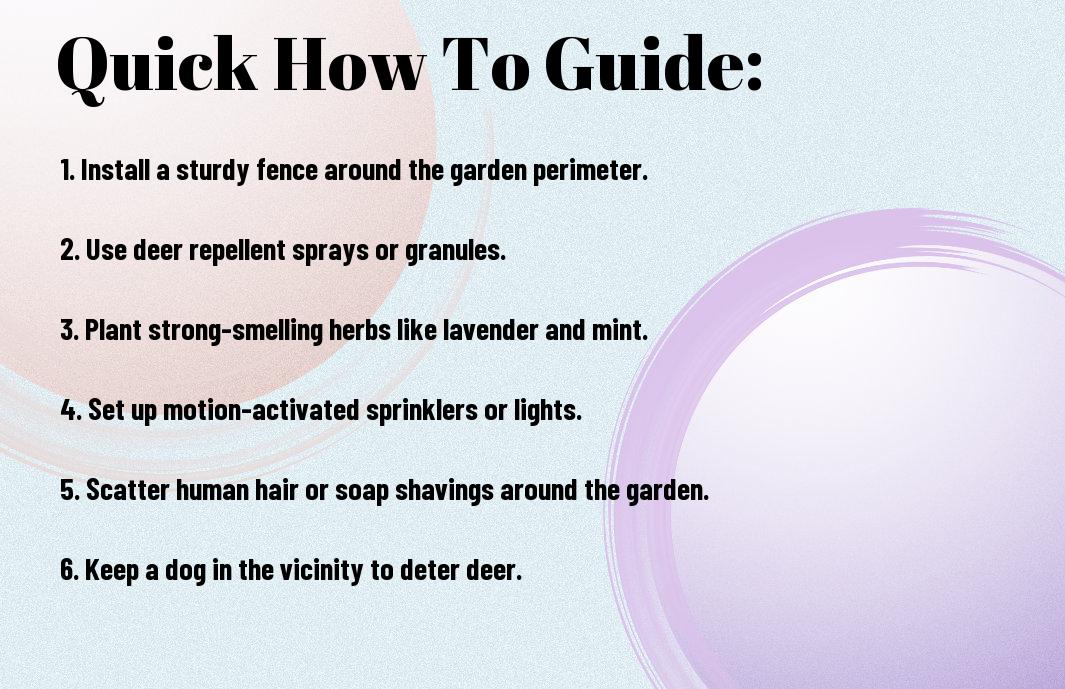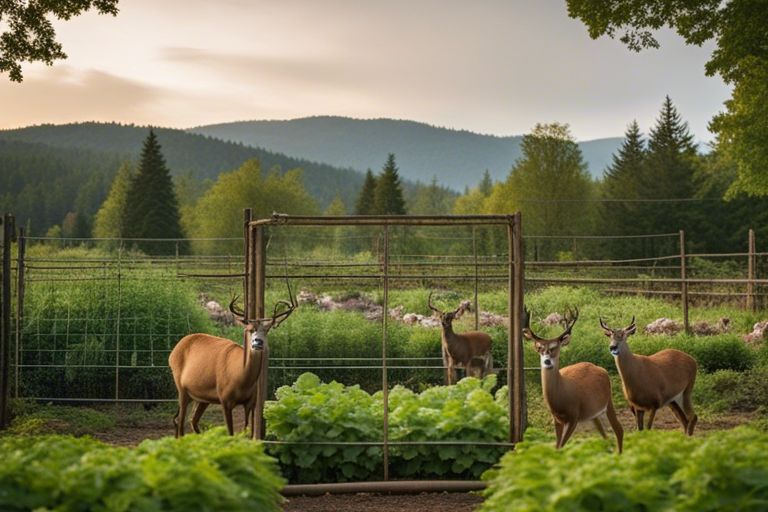This guide will provide you with effective strategies to protect your beloved vegetable garden from deer damage. Deer can wreak havoc on your hard work in the garden, but with the right preventative measures in place, you can enjoy your harvest without worrying about these hungry visitors. We will cover proven methods such as fencing, repellents, natural deterrents, and other tips to keep deer at bay and allow your vegetables to thrive undisturbed. Don’t let deer ruin your gardening efforts – follow these tips to protect your vegetable garden from these pests.
Key Takeaways:
- Use physical barriers: Fencing or cages around your vegetable garden can effectively keep deer away and protect your plants.
- Plant deer-resistant plants: Choose vegetables and herbs that deer typically avoid, such as strong-smelling herbs like rosemary or plants with prickly textures.
- Repellents: Use natural or commercial repellents that have odors or tastes that deer find unpleasant to deter them from browsing in your garden.


Factors Attracting Deer to Your Garden
You have worked hard to cultivate your vegetable garden, but if you are constantly battling deer munching on your plants, it can be frustrating. There are several factors that attract deer to your garden, making it a tasty buffet for these animals. Understanding these factors can help you take the necessary steps to deter deer from feasting on your hard work. Thou must be proactive in addressing these attractants to protect your garden.
Types of Vegetation That Attract Deer
| Attract | Avoid |
|---|---|
| Hostas | Marigolds |
| Daylilies | Lavender |
| Impatiens | Daffodils |
| Roses | Tulips |
| Beans | Chives |
Assume that deer are attracted to plants with soft foliage, strong scents, and tender shoots. By avoiding these types of vegetation in your garden, you can help deter deer from grazing on your plants.
Other Attractants: Water and Shelter
If your garden is located near a water source like a pond or stream, deer may be attracted to it for drinking purposes. Additionally, if there is nearby shelter such as dense vegetation or wooded areas, deer may feel more comfortable wandering into your garden in search of food.
The presence of water and shelter near your garden can make it more appealing to deer. By addressing these attractants, you can make your garden less inviting to these hungry visitors.
Physical Deterrents and Barriers
Fencing Options for Deer Prevention
Prevention is key when it comes to keeping deer out of your vegetable garden. One of the most effective methods is installing a physical barrier in the form of a sturdy fence. Opt for a fence at least 8 feet tall to deter deer from jumping over. Ensure the fence is securely anchored to the ground to prevent deer from burrowing underneath.
Using Netting and Covers to Protect Plants
Assuming you have a smaller garden or specific plants you want to protect, using netting and covers can be a practical solution. These can be draped over plants or entire garden beds to prevent deer from accessing them. Make sure the netting is secured tightly to avoid deer getting tangled or finding their way in.
Understanding that deer are persistent and clever animals, it is important to regularly inspect and maintain any physical barriers or covers you put in place. Any gaps or weaknesses can be exploited by deer, so stay vigilant and make necessary repairs promptly to ensure they remain effective.

Natural and Chemical Repellents
Homemade and Commercial Deer Repellents
With the increase in deer populations encroaching on vegetable gardens, it’s imperative to explore effective deer repellents. Homemade solutions like garlic or hot pepper spray can be made easily and sprayed on plants to deter deer. Commercial options such as motion-activated sprinklers or predator urine can also be successful in keeping deer at bay. Experiment with different repellents to find what works best for your garden.
Planting Deer-Resistant Vegetables and Companion Plants
Chemical deterrents are another option to consider for keeping deer away from your vegetable garden. Products like deer repellent sprays or pellets utilize foul-smelling or bitter-tasting substances, deterring deer from feeding on your plants. Follow the instructions carefully when applying these chemical repellents to ensure their effectiveness and safety for your plants.
Planting deer-resistant vegetables and companion plants is a proactive approach to protect your garden. Vegetables like onions, garlic, and tomatoes are less appealing to deer due to their strong scents or tastes. Additionally, planting aromatic herbs like lavender or marigolds can help repel deer from your garden by masking the scent of more enticing plants. By strategically planning your garden layout with deer-resistant options, you can create a natural barrier against unwanted deer visitors.
Innovative Strategies and Tips
For many gardeners, keeping deer away from their vegetable garden can be a constant battle. However, with some innovative strategies and tips, you can protect your precious plants and enjoy a bountiful harvest without the interference of these pesky herbivores.
How-to Implement Scare Tactics
If you want to try scare tactics to deter deer from entering your garden, consider using motion-activated devices like sprinklers or lights. These sudden bursts of movement or sound can startle deer and teach them to avoid your garden in the future. Remember to change the placement of these devices regularly to prevent the deer from getting used to them.
Timing and Maintenance for Ongoing Deer Control
Some gardeners have found success in deterring deer by maintaining a consistent schedule for garden maintenance. Regularly trimming bushes and removing tall weeds can make your garden less appealing to deer, who prefer areas with ample cover. The use of repellents or fencing should also be consistently checked and maintained for optimal effectiveness.
The key to successful deer control is to stay vigilant and proactive in your efforts. By combining different strategies and regularly monitoring your garden for any signs of deer activity, you can effectively keep these animals at bay and protect your vegetable garden. Any lapse in your efforts could potentially invite deer back into your garden, causing damage to your plants.
Summing up
Hence, keeping deer away from your vegetable garden requires a combination of strategies like using physical barriers, repellents, planting deer-resistant plants, and employing scare tactics. It’s important to be proactive and consistently rotate these methods to effectively deter deer from damaging your crops. By implementing these measures, you can enjoy a thriving vegetable garden free from deer interference.
FAQ
Q: Why do deer pose a threat to vegetable gardens?
A: Deer pose a threat to vegetable gardens because they feed on a variety of plants, including many common vegetables. Their browsing can cause significant damage to crops, leading to potentially devastating losses for gardeners.
Q: What are some signs that deer have been in my vegetable garden?
A: Signs that deer have been in your vegetable garden include chewed or eaten plants, trampled vegetation, and distinctive deer tracks in the soil. Additionally, deer can leave behind droppings that may indicate their presence.
Q: How can I keep deer away from my vegetable garden?
A: There are several effective methods for keeping deer away from your vegetable garden, including installing fencing, using scent deterrents such as predator urine, planting deer-resistant plants, and implementing scare tactics like motion-activated sprinklers or noise-making devices.
Q: What type of fencing is best for keeping deer out of a vegetable garden?
A: The most effective type of fencing for keeping deer out of a vegetable garden is a tall fence (at least 8 feet high) made of materials like wire mesh or electric fencing. Fences should be sturdy and either have no gaps or be angled outward at the top to prevent deer from jumping over.
Q: Are there any natural remedies for deterring deer from a vegetable garden?
A: Yes, there are several natural remedies that can help deter deer from a vegetable garden. These include planting deer-resistant plants like lavender and sage, spreading coffee grounds or human hair around the garden, and using homemade repellents containing ingredients like garlic, hot pepper, or rotten eggs.
